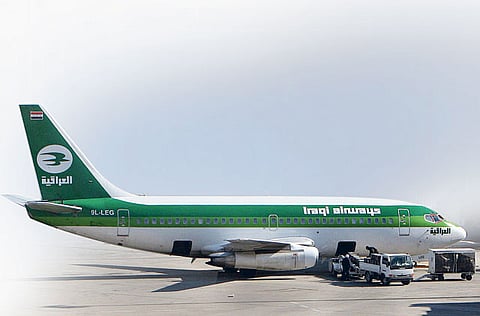Air freight sector has a low priority
Plans to develop profitable aspect of country's economy sidetracked by focus on infrastructure for immediate needs in health and education

Iraq's development plan for air freight is practical and profitable for a country rich in oil and gas, but in reality it is not a priority. Building infrastructure in other sectors such as health and education is more urgent, a top Iraqi official in the sector said.
"The total cost of the plan to develop Iraq's air freight sector, including airports and airlines, ranges between $25 billion [Dh91.7 billion] and $30 billion," Adnan Blebil, Director General of the Iraqi Civil Authority, said.
Almost one-fifth of the amount, $5 billion to $6 billion, is needed to improve Baghdad International Airport, he added in an interview with Gulf News.
Baghdad Airport, the largest among the six domestic airports, has great potential to generate revenues. Expenditure and revenue projections for the airport's upgrading plan are expected to break even in about six years, Blebil added.
The master plan to improve Baghdad airport is expected to create 70,000 jobs and generate revenues of up to $1 billion a year. The plan includes creating a free zone, warehouses, cargo village, business park, three more terminals and domestic terminal. Each new terminal should be capable of handling 2.5 million passengers a year. Currently, Baghdad airport manages about 7 million passengers a year.
Located 16 kilometres west of Baghdad, the airport was known as Saddam International Airport until the 2003 US-led invasion. But the airport was hampered by nearly 13 years of UN economic sanctions imposed in 1990, and escaped the two wars of 1991 and 2003.
The other two airports built before 2003 are in Basra in the south and Mosul in the north.
In the past seven years, three more airports were built in Erbil and Sulaimaniyah in Kurdistan and one in Najaf in the south. Najaf and Karbala are the sites of some of the holiest Shiite shrines and receive hundreds of thousands of pilgrims every year.
Rebuilding
However, as Iraq prepares for a massive reconstruction process, improving Baghdad airport is not a top priority. "We have [other pressing] priorities," Blebil said, "such as developing the oil sector."
"We are still importing some refined oil products. Developing the oil sector would basically give you more production capability. Secondly, we need to develop other sectors, such as education, health, security, electricity, [i.e.] the infrastructure of the country."
Blebil insists on differentiating between developing the infrastructure of Iraq's air freight and increasing present sources of income. "Baghdad airport currently is functioning, and the issue of increasing its revenues and profits within the framework of upgrading the airport to increase sources of income is considered [by many] a luxury in [such] hard times," the official said.
Air freight is considered essential to rebuilding the country's bridges with the rest of the world.
The "air embargo on Libya harshly affected the country," he said in reference to the several years of sanctions against Libya over suspected terror links since the early nineties until 2003.
"Today, you need speed to connect with the world. Today, people are using the internet instead of the [postal] letters. Pace is the important element in communication."
While the borders with Iraq's neighbours Iran, Saudi Arabia, Kuwait, Jordan, Syria and Turke, are open to overland freight, Iraq's air links are not open to all countries.
Expansion
Many airlines have flights to Baghdad and Kurdistan, and before the end of this year, more airlines are expected to do so.
Arab airlines that already fly to either Baghdad or Kurdistan include Royal Jordanian, Lebanon's Middle East, Syria'a private Ajnehat Al Sham, (Wings of Al Sham) and Gulf Air. Recently Abu Dhabi's Al Etihad started flights. Dubai's Emirates announced its plans start services within a few weeks, and Qatar Airways is expected to follow suit before the end of the year, along with some other low-cost Arab carriers.
Among the non-Arab airlines flying to Iraq are Austrian and Turkish Airlines. Lufthansa is expected to join them soon.
Iraqi Airways destinations included Athens, Beirut, Damascus, Istanbul, Dubai, Tehran and Amman as well as domestic flights to Najaf, Basra, Erbil, Sulaimaniyah and Mosul.
Last week, Iraqi Airways announced it was halting flights to London and Stockholm over a financial dispute with Kuwait. A day later, the company was dissolved for the same reason, and sources said the process of forming a new airline is underway.
"The new company is going to be established on a public-private partnership basis," the well-informed source told Gulf News.
Senior aviation officials told Gulf News earlier that they are planning a trip in the near future to "activate an agreement between the two countries," Blebil said. "After that, God willing, we are planning other visits to Malaysia and China for the same purpose."



